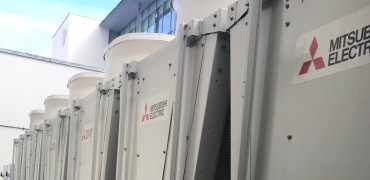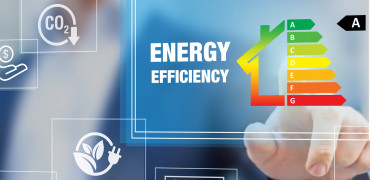We should all agree that the work of decarbonising heating and hot water in our existing buildings needs to start today – and the technology needed is already here to do it.
With the Future Homes Standard and Future Buildings Standard, the government has set out its stall – we need to wean ourselves off gas for heating and hot water systems in our homes and other buildings.
We are still waiting to see how these two documents translate into updates of the Building Regulations and the Heat in Buildings Strategy.
Still, one thing is clear, changing the course of new buildings won’t be enough – we need to address heating and hot water systems in our existing homes and other buildings.
Installation in existing buildings will be vital to making headway on cutting back on our reliance on gas boilers
Using heat pumps
According to the Climate Change Committee (CCC), around 85% of existing homes and 63% of public and commercial heating is met through natural gas. So, we should not underestimate the scale of the challenge.
Heat pumps are high on the government agenda as one of the essential technologies to replace gas boilers.
Mitsubishi Electric has already seen the successful installation of its domestic Ecodan heat pumps in thousands of homes and commercial buildings across the UK, so this is a tried-and-tested technology for many homeowners.
And heat pump technology continues to develop to suit an ever-wider range of project types. For example, in commercial buildings, heat pumps have not always been able to meet the demand for high-temperature hot water.
In response to growing requirements, Mitsubishi Electric launched its Ecodan QAHV, which produces hot water up to 90 degrees Centigrade, making it ideal for hotels and the leisure sector.
As an added benefit, the QAHV uses CO2 refrigerant, which has a GWP (Global Warming Potential) of 1 – lowering the whole system’s embedded carbon footprint.
Heat networks
Of course, when looking for solutions to significant challenges like decarbonising heating, it is vital to have more than one potential solution. So the government is also looking to grow the use of heat networks across the UK.
The latest London Plan is an excellent example of how this could work in our cities and we have produced a free, downloadable CPD Guide which is available at this link.
Again, installation in existing buildings will be vital to making headway on cutting back on our reliance on gas boilers.
One approach is the low-temperature communal heating system which is ideal for multi-residential buildings.
Also known as an ambient loop, in this system, a heat pump can provide low-temperature water (around 25 degrees Centigrade) from a centralised energy centre.
Each apartment in the building also has a heat pump that uses this low-temperature water and raises the temperature to around 60 degrees Centigrade for hot water and space heating requirements.
Mitsubishi Electric has developed its water-to-water Ecodan Hydrodan heat pump with ambient loop systems in mind.
Using waste heat
There are obvious benefits to the ambient loop in removing the need for a gas boiler and lower energy costs for occupants.
The bonus of the ambient loop approach is that the source of heating for the energy centre can be waste heat from other buildings. For example, in a multi-use development with residential areas close to office buildings, the energy centre in a communal heating system could use heat ejected from the office cooling system.
We need to move our existing stock away from fossil fuels, and the technology is here that can go a long way to solving that problem. Heat pump technology has been developing and can be used across a much more comprehensive range of building types than ever before.
Although upcoming legislation will be a significant driver for changing our heating and hot water systems, the scale of upgrades required for existing buildings means that we should start this work as soon as possible.
Dave Archer is National M&E Manager




